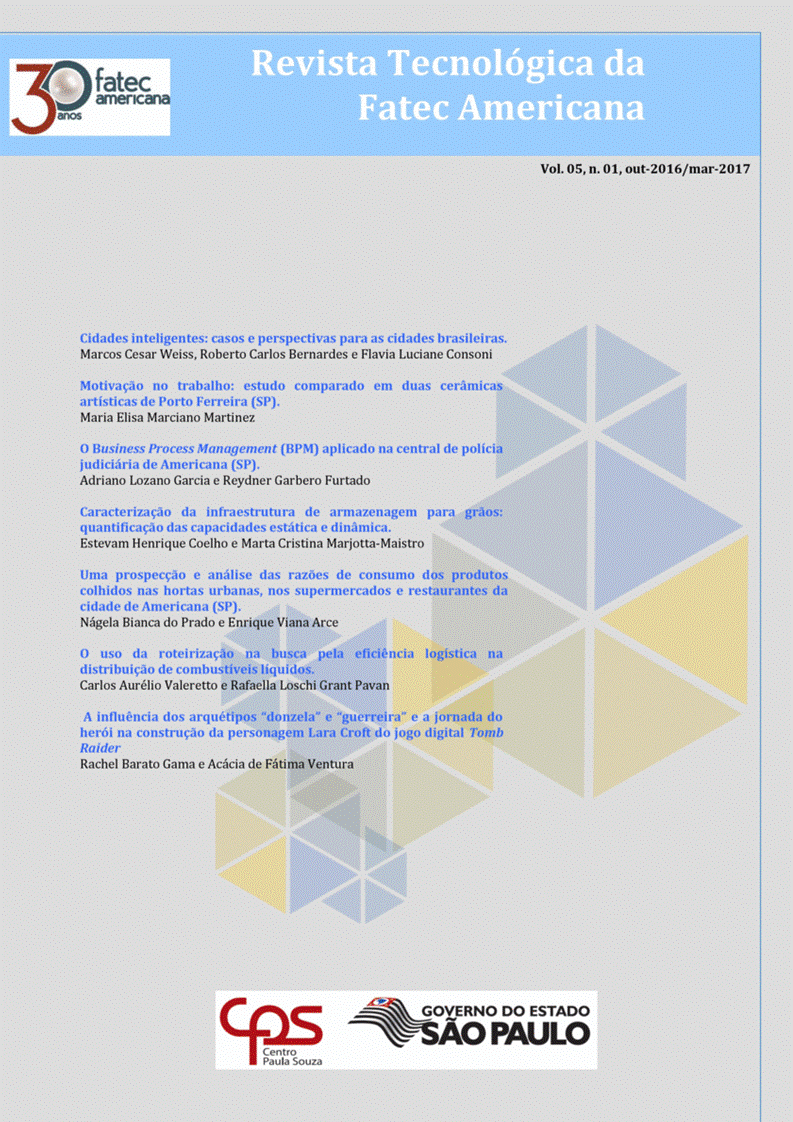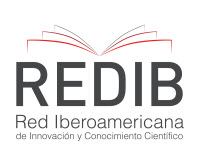CIDADES INTELIGENTES: casos e perspectivas para as cidades brasileiras.
Abstract
Com o crescimento populacional crescem os desafios para governos, empresas e academia. Novas formas de geração de energia, preservação de recursos naturais, transportes eficientes, educação e saúde, segurança e alimentação são os grandes desafios a serem vencidos nos próximos anos. Neste contexto, as tecnologias da informação e comunicação (TIC) assumem importante papel como facilitadoras para a tomada de decisão e para a criação de inovações que melhorem as capacidades de gestão das infraestruturas e o provimento de serviços aos cidadãos. No cenário brasileiro, os desafios se apresentam ainda de forma mais intensa, dadas as condições atuais da infraestrutura tecnológica da maioria das cidades. Esse trabalho tem por objetivo demonstrar o atual estágio das cidades do Rio de Janeiro, Porto Alegre e Curitiba relativamente à materialização do conceito de cidade inteligente como um novo paradigma para a gestão das cidades, contribuindo para o entendimento e agenda de pesquisas sobre esse contemporâneo tema.
Downloads
References
ACCENTURE. Building and Managing an Intelligent City: How new strategies, technologies, open platforms and effective governance can help create cities that are sustainable and attractive to ongoing development, 2011. Disponível em http://www.accenture.com/us-en/Pages/insight-building-managing-intelligent-city.aspx. Acesso em 05/12/2012.
BATAGAN, L. Smart Cities and Sustainability Models. Informatica Economica, v. 15, n. 3, p. 80-87, 2011.
BENKO, G.; LIPIETZ, A. (org.). La richesse des régions. La nouvelle géographie socio-économique. Paris: Presses Universitaires de France, 2000.
BOSCHMA,R. A. Proximity and Innovation: A Critical Assessment. Regional Studies Association - East Sussex, v.39, n. 1, p. 61–74, 2005.
BOYKO, C.T. et al. Addressing sustainability early in the urban design process. Management of Environmental Quality - Bradford, v. 17, n. 6, p. 689-706, 2006.
CADENA, A.; DOBBS, R.; REMES, J. The Growing Economic Power of Cities. Journal of International Affairs, v. 65, n. 2, p. 1-17, 2012.
CASTELLS, M. The information age: economy, society and culture. Malden: Blackwell, 1996.
CASTELLS, M.; HALL, P. Las tecnópolis del mundo: la formación de los complejos industriales del siglo XXI. Madrid: Alianza Editorial, 1994.
CHOURABI, H. Smart Cities: An Integrative Framework. 45th Hawaii International Conference on System Sciences, p. 2289-2297, 2012.
CISCO. Industry solutions. Disponível em http://www.cisco.com/web/strategy/index.html. Acesso em 08/06/2012, 2012.
COLLIS, J; HUSSEY, R. Pesquisa em administração: um guia prático para alunos de graduação e pós-graduação. 2. ed. Porto Alegre: Bookman, 2006.
COOKE, P. Regional Innovation Systems, Clean Technology & Jacobian Cluster-Platform Policies. Regional Science Policy & Practice, v. 1, n. 1, p. 23-45, 2008.
COOKE, P.; PORTER, N. Regional-National Eco-innovation interactions, OECD Environmental Working Paper, OECD, Paris, 2009.
CRESWELL, J. W. Research design: qualitative, quantitative and mixed methods approaches, 2. ed. Thousand Oaks: Sage, 2002.
CROMER, C. Understanding Web 2.0’s influences on public e-services: A protection motivation perspective. Innovation: Management, Policy & Practice, v. 12, n. 2, p. 192-205, 2010.
DOGDSON, M.; GANN, D. Technological Innovation and Complex Systems in Cities. Journal of Urban Technology, v. 18, n. 3, p. 101-113, 2011.
DUTTA, S. et al. The global information technology report 2009–2010: world economic forum. Genebra: SRO-Kundig, 2010.
DUTTA, S. et al. The Global Innovation Index 2011: accelating growth and development. Fontainebleau: INSEAD, 2011.
ERNST & YOUNG. Cities for citizens: Ambitious and sustainable, 2011. Disponível em http://www.doingbusiness.ro/images/files/1129597_Cities_for_Citizens_Final.pdf. Acesso em 05/12/2012.
ESTY, D. C.; WINSTON, A. Green to gold: how smart companies use environmental strategy to innovate, create value, and build competitive advantage. New Jersey: John Wiley & Sons, 2009.
ETZKOWITZ, H. The triple helix of university-industry-government: implications for policy and evaluation. Science Policy Institute, Working Paper, 2002-11.
FLICK, U. Uma introdução à pesquisa qualitativa. 2. ed. Porto Alegre: Bookman, 2004.
FRIEDMANN, J. The world city hypothesis. Development and Change, v. 17, p. 69-83, 1986.
GIFFINGER, R.; GUDRUN, H. Smarter Cities Ranking: An Effective Instrument for the Positioning of Cities? ACE: Architecture, City and Environment, v. 12, p. 7-25, 2010.
GIL, A.C. Como elaborar projetos de pesquisa. 5. ed. São Paulo: Atlas, 2010.
GUPTA, J. Global Sustainable Development Governance: Institutional Challenges from a Theoretical Perspective. International Environmental Agreements : Politics, Law and Economics, v. 2, n. 4, p. 361-361, 2002.
HALL, R. E. et al. The vision of a smart city. In: Proceedings of the 2nd International Life Extension Technology Workshop, 2000. Disponível em http://www.osti.gov/bridge/servlets/purl/773961-oyxp82/webviewable/773961.pdf. Acesso em 15/08/2012.
HAMMER, S. et al. Cities and Green Growth: A Conceptual Framework. OECD Regional Development Working Papers 2011-08, 2011. OECD Publishing. Disponível em http://dx.doi.org/10.1787/5kg0tflmzx34-en. Acesso em 04/09/2012.
HARRISON, C.; DONNELLY, I. A. A theory of smart cities. White Paper, IBM Corporation, 2011. Disponível em http://journals.isss.org/index.php/proceedings55th/article/ viewFile/1703/572. Acesso em 09/06/2012.
HENDERSON, H. Além da globalização: modelando uma economia global sustentável. São Paulo: Cultrix, 2007.
HERNÁNDEZ-MUÑÕZ , J.M. et al. Smart Cities at the Forefront of the Future Internet. LNCS 6656, p. 447–462, 2011.
IBGE – INSTITUTO BRASILEIRO DE GEOGRAFIA E ESTATÍSTICA. Censo demográfico de 2010. Disponível em http://www.ibge.gov.br/home/estatistica/ populacao/censo2010/ default.shtm . Acesso em 10/06/2012.
IBM. Smarter Cities. Disponível em http://www.ibm.com/smarterplanet/us/en/smarter_cities/overview/index.html?re=spf. Acesso em 08/06/2012, 2012.
JOHNSON, B. Cities, systems of innovation and economic development. Innovation: Management, Policy & Practice, v. 10, n. 2-3, p. 146-155, 2008.
KANTER, R. M.; LITOW, S. S. Informed and interconnected: A manifesto for smarter cities. Harvard Business School General Management Unit Working Paper 09-141, 2009, Disponível em http://papers.ssrn.com/sol3/papers.cfm?abstract_id=1420236. Acesso em 14/08/2012.
KOMNINOS, N.. et al. Developing a Policy Roadmap for Smar Cities and the Future Internet. 45th Hawaii International Conference on Systems Sciences, 2011. Disponível em http://www.urenio.org/wp-content/uploads/2008/11/2011-eChallenges_ref_196-Roadmap-for-Smart-Cities-Publised.pdf. Acesso em 14/09/2012
LEYDESDORFF, L.; DEAKIN, M. The Triple Helix Model and the Meta-Stabilization of Urban Technologies. Cornell University Library, 2010. Disponível em http://arxiv.org/abs/1003.3344v1. Acesso em 22/09/2012.
LOMBARDI, P. et al. An advanced triple-helix network model for smart cities performance. Research Memorandum 2011-45, Universidade de Amsterdam, 2011. Disponível em http://dare.ubvu.vu.nl/bitstream/handle/1871/24007/rm%202011-45.pdf?sequence=1. Acesso em 20/09/2012.
McKINSEY. Government designed for new times - 2012. Disponível em http://www.mckinsey.com/features/government_designed_for_new_times/table_of_contents. Acesso em 05/12/2012.
MEIER, W. J.; ULFERTS, G. W.; HOWARD, T. L. Transforming city governments through IT. The Review of Business Information Systems, Fourth Quarter, v. 15, n. 4, 2011.
NAM, T.; PARDO, T.A. Conceptualizing smart city with dimensions of technology, people and institutions. Center for Technology in Government. University of Albany, The Proceedings of the 12th Annual International Conference on Digital Government Research, 2011a. Disponível em http://www.ctg.albany.edu/publications/journals/dgo_2011_smartcity/dgo_2011_smartcity.pdf. Acesso em 10/06/2012.
NAM, T.; PARDO, T.A. Smart city as urban innovation: focusing on management, policy and context. Center for Technology in Government. University of Albany, 5th International Conference on Theory and Practice of Electronic Governance (ICEGOV2011) , 2011b. Disponível em http://www.ctg.albany.edu/publications/journals/ icegov_2011_smartcity. Acesso em 20/06/2012.
ONU – ORGANIZAÇÃO DAS NAÇÕES UNIDAS. World Urbanization Prospects, The 2011 revision, 2012. Disponível em http://esa.un.org/unpd/wup/index.htm. Acesso em 06/06/2012.
PALLOT, M. et al. Future Internet and Living Lab Research Domain Landscapes: Filling the Gap between Technology Push and Application Pull in the Context of Smart Cities. eChallenges e-2011 Conference Proceedings. Disponível em http://www.urenio.org/wp-content/uploads/2008/11/2011-eChallenges-Nr-200-Future-Internet-and-Living-Labs-Published.pdf. Acesso em 14/08/2012.
PWC. Cities of opportunity - 2011. Disponível em http://www.pwc.com/us/en/cities-of-opportunity/2012/assets/cities-of-opportunity-2011.pdf. Acesso 05/12/2012.
RASOOLIMANESH, S.M.; BADARULZAMAN, N.; JAAFAR, M. Achievement to Sustainable Urban Development using City Development Strategies: A Comparison between Cities Alliance and the World Bank definitions. Journal of Sustainable Development, v. 4, n. 5, p. 151-166, 2011.
ROMAN, M. Governing from the middle: the C40 Cities Leadership Group. Corporate Governance, v. 10, n. 1, p. 73-84, 2010.
SAP. Strengthening the connection between government and citizens. Disponível em http://www.sap.com/industries/public-sector/index.epx. Acesso em 08/06/2012, 2012.
SASSEN, S. As cidades na economia mundial. São Paulo: Studio Nobel, 1998.
SCHAFFERS, H. et al. Smart Cities and the Future Internet: Towards Cooperation Frameworks for Open Innovation. LNCS 6656, p. 431-446, 2011.
SCHLUEP, M. et al. Recycling – from e-waste to resources. UNEP – United Nations Environment Programme, 2009. Disponível em http://www.unep.org/PDF/PressReleases/E-Waste_publication_screen_FINALVERSION-sml.pdf. Acesso em 25/10/2012.
SCOTT, A.J. Regions and the World Economy: The Coming Shape of Global Production, Competition, and Political Order. Oxford: Oxford University Press, 1998.
SCOTT, A.J.; AGNEW, J.; SOJA, E.W.; STORPER, M. Global city-regions: an overview. In: SCOTT, A.J. (ed). Global City-regions:Trends, Theory, Policy. Oxford: Oxford University Press, 2001, p. 11-30.
SIEMENS. Siemens infrastructure and cities. Disponível em http://www.siemens.com/entry/ infrastructure-cities/cc/en/index.htm. Acesso em 08/06/2012.
STORPER, M. The city: Centre of economic reflexivity. The Service Industries Journal, v. 17, n. 1, p. 1-27, 1997.
TOPPETA, D. The smart city vision: how innovation and ICT can build smart, “livable”, sustainable cities. The Innovation Knowledge Foundation, 2010. Disponível em http://www.thinkinnovation.org/file/research/23/en/Toppeta_Report_005_2010.pdf. Acesso em 15/06/2012.
UN-HABITAT. State of the World’s Cities Report 2012/2013: Prosperity of Cities. World Urban Forum Edition. United Nations Human Settlements Programme, 2012.
WASHBURN, D. et al. Helping CIOs understand “smart city” initiatives: defining the smart city, its drivers, and the role of the CIO. Cambridge, MA: Forrester Research, Inc. , 2010. Disponível em http://public.dhe.ibm.com/partnerworld/pub/smb/smarterplanet/ forr_help_cios_und
WEBBER, L., WALLACE, M. Green tech: how to plan and implement sustainable IT solutions. New York: AMACON, 2009.
YIN, R.K.; Estudo de Caso: planejamento e métodos. 3. ed. Porto Alegre: Bookman, 2005.
Downloads
Published
Issue
Section
License
A “Revista Tecnológica da Fatec de Americana” é uma publicação semestral digital de responsabilidade da “Faculdade de Tecnologia de Americana”, “Centro Estadual de Educação Tecnológica Paula Souza”, com a publicação de trabalhos de caráter interdisciplinar realizados pelas comunidades discente, docente e pesquisadores internos e bem como por pesquisadores externos.
The “Revista Tecnológica da Fatec Americana” is a biannual digital publication, under “Faculdade de Tecnologia de Americana” responsability, from “Centro Estadual de Educação
Tecnológica Paula Souza”, which encompasses interdisciplinary papers submitted by students, professors and researches of the community as well as external researches.
La “Revista Tecnológica da Fatec Americana” es una publicación digital semestral de responsabilidad de esa “Faculdade de Tecnologia de Americana”, “Centro Estadual de Educação Tecnológica Paula Souza”, cuyo objetivo es publicar trabajos de carácter interdisciplinario realizados tanto por el profesorado, por el alunnado e investigadores internos, como por investigadores externos.
É permitido a reprodução parcial desde que citado a fonte.
Partial reproduction is permitted if the source is cited.
Su reproducción parcial está permitida siempre e cuando se mencione la fuente.
Políticas editoriais: Leia em www.fatec.edu.br/revista/politicas
Editorial Politics: Read in www.fatec.edu.br/revista/politicas
Sítio: www.fatec.edu.br/revista
Site: www.fatec.edu.br/revista






